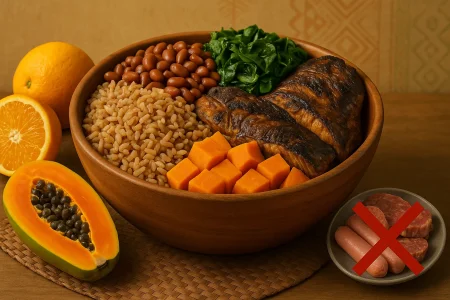
Food Won't Cure You. But It Can Help You.
If you've been diagnosed with fibroids, you've probably heard conflicting diet advice. Can certain foods truly shrink fibroids? Will avoiding red meat stop them from growing? The truth sits somewhere between wishful thinking and medical fact. Whilst diet alone cannot cure fibroids, research shows that what you eat can significantly influence hormone levels, inflammation, and symptom severity.
For Nigerian women navigating fibroid management, understanding which local foods support your health,and which might worsen symptoms, offers a practical tool alongside medical treatment.
When Tradition Meets Medicine
Fibroids are hormone-sensitive growths that respond to estrogen levels in your body. Studies demonstrate that diet can influence hormone balance, particularly estrogen, which fuels fibroid growth. When you gain weight, your body produces more fat cells, which create additional estrogen. Conversely, certain foods help your body process and eliminate excess hormones.Here's the irony: research on African women shows that traditional African diets rich in vegetables and fruits are associated with lower fibroid occurrence, whilst Western-style processed foods correlate with increased cases. Our grandmothers' plates protected them. Then we traded beans for burgers and paid the price.
Plates That Protect: Foods Your Body Needs
The Power of BeansBeans porridge contains fibre that helps regulate estrogen levels by facilitating hormone elimination through stool. Whether you prefer black-eyed beans, brown beans, or lentils, these protein-rich foods support healthy weight management whilst providing sustained energy.
What to try: Beans porridge with plantain, moi moi, or akara (in moderation due to frying).
Brown Over White, Always
Swapping white rice for brown rice provides essential nutrients that may slow fibroid growth. Whole grains are high in fibre and lower in simple carbohydrates that spike blood sugar levels.
What to try: Make jollof rice with brown rice or ofada rice, or incorporate oats and millet into your meals.
Green Leaves, Strong Bodies
Nigerian vegetables like ugu (fluted pumpkin leaves), efo (spinach), and water leaf are nutritional powerhouses. Cleveland Clinic research shows that eating four servings of fruits and vegetables daily significantly lowers fibroid risk compared to just one serving.
What to try: Edikang ikong soup, efo riro, vegetable stew with minimal palm oil, or fresh salads.
Yams and Sweet Potatoes: Old Wisdom, New Science
These Nigerian staples contain natural carotenes and fibre essential for managing fibroids. They also provide complex carbohydrates that don't spike blood sugar like refined options.
What to try: Boiled yams with vegetable sauce, roasted sweet potatoes, or yam porridge with minimal oil.
Fish Over Meat, Every Time
Omega-3 fatty acids in cold-water fish like tilapia and tuna help reduce inflammation that contributes to fibroid growth. Choose grilled or steamed preparations over fried.
What to try: Grilled titus, fish pepper soup, steamed mackerel with vegetables.
Fruits: Nature's Medicine
Research shows women who eat two or more servings of citrus fruit daily have lower fibroid risk. Nigerian fruits like oranges, pineapples, watermelon, pawpaw, and bananas provide essential vitamins and antioxidants.
What Feeds Fibroids: Foods That Betray You
Red Meat: The Estrogen BombRed meat contains added hormones, particularly estrogen, which can fuel fibroid growth. Nigerian favourites like suya, peppered beef, and assorted meats should be consumed sparingly.
Better swap: Replace with fish, chicken (white meat), or plant-based proteins like beans.
Stock Cubes: The Hidden Enemy
African health researchers have identified popular stock cubes (Maggi, Knorr) as a risk factor for fibroid development. These cubes contain high sodium and chemical additives that disrupt hormone balance.
Better swap: Season with fresh peppers, onions, garlic, ginger, curry leaves, and herbs.
White Carbs: Fast Energy, Slow Poison
White bread, white rice, pasta, cakes, and pastries cause blood sugar spikes that trigger insulin production, potentially promoting fibroid growth. High sugar intake leads to inflammation and hormonal imbalances.
Better swap: Choose brown rice, whole wheat bread, oats, or traditional grains like acha (fonio).
Palm Oil: Friend or Foe?
Whilst red palm oil contains beneficial vitamins A and E, using it excessively adds unnecessary saturated fats. Moderation is key.
Better approach: Use minimal amounts for flavour, or substitute with olive or vegetable oil in some dishes.
Alcohol: The 50% Risk Increase
Research shows drinking one or more beers daily increases fibroid risk by over 50%. Alcohol raises hormone levels necessary for fibroid growth and triggers inflammation. Sugary soft drinks similarly spike blood sugar levels.
Better swap: Water, coconut water, zobo (hibiscus tea) without excessive sugar, or freshly squeezed fruit juices.
The Vitamin D Gap: Why Nigerian Women Struggle
Nigerian women face a particular risk for vitamin D deficiency due to their darker skin tones, which require more sun exposure to produce adequate vitamin D. Research shows that vitamin D deficiency is often seen in women with fibroids, and raising levels could help avoid this condition.Natural sources: Fatty fish (titus, mackerel), egg yolks, fortified foods, and sensible sun exposure (15-20 minutes daily).
From Grandmother's Kitchen: Unripe Palm Kernel
Herbal practitioners in Eastern Nigeria advocate unripe African oil palm kernel seeds for managing fibroids. Preliminary research in rats showed these kernels possess bioactive components that may help prevent fibroid-related hormonal changes. However, human studies are needed to confirm effectiveness and safety.One Woman's Plate: A Day of Eating Well
Sample Day:- Morning: Oats porridge with fruits and nuts
- Afternoon: Brown rice jollof with grilled fish and vegetable salad
- Evening: Bean porridge with boiled sweet potatoes
- Between meals: Fresh fruits, roasted groundnuts (in moderation)
- Gradually transition from white to brown rice rather than switching completely overnight
- Season with fresh ingredients instead of stock cubes
- Grill, steam, or boil instead of frying when possible
- Fill half your plate with vegetables at each meal
- Stay hydrated with plenty of water
What Food Can—And Cannot—Fix
Diet alone cannot shrink or eliminate fibroids. It can help manage symptoms, potentially slow growth, support hormone balance, and improve your overall health whilst you pursue medical treatment. Think of dietary changes as one tool in your fibroid management toolkit—powerful when combined with proper medical care, but not a replacement for it.If you're experiencing heavy bleeding, severe pain, or other debilitating symptoms, consult a fibroid specialist. Treatment options now available in Nigeria range from medication to minimally invasive procedures, offering relief while you support your body through nutrition.
Your diet is something you control three times a day. Making informed choices about Nigerian foods that support your health costs nothing extra and benefits your entire wellbeing, not just your fibroids.
Sources
- PMC Medical Research (2023): Role of Nutrition in Uterine Fibroids - Comprehensive review of diet's impact on fibroids
- Cleveland Clinic (2022): Foods to Reduce Uterine Fibroids - Evidence-based dietary recommendations
- Babymigo Nigeria (2023): 5 Nigerian Foods Good for Women with Fibroids - Nigerian-specific food guidance
- Pan African Review (2023): Uterine Fibroids and African Traditional Remedies - African diet patterns and traditional approaches
- Houston Fibroids (2025): Worst Foods for Fibroids - Foods that exacerbate symptoms
- Georgia Fibroids (2025): The Fibroid Diet - Managing symptoms through food
- Healthline (2023): Can Foods Help Shrink Fibroids? - Evidence-based dietary guidance




